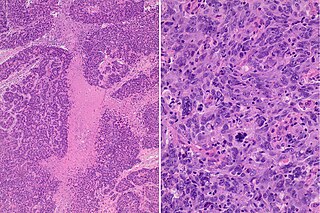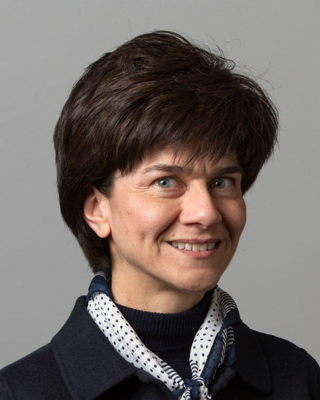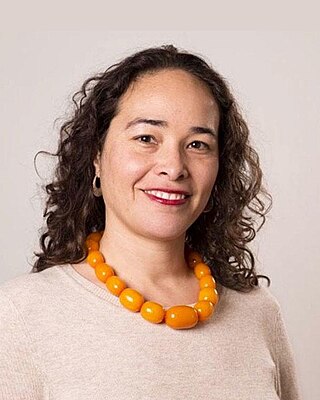The National Cancer Institute (NCI) coordinates the United States National Cancer Program and is part of the National Institutes of Health (NIH), which is one of eleven agencies that are part of the U.S. Department of Health and Human Services. The NCI conducts and supports research, training, health information dissemination, and other activities related to the causes, prevention, diagnosis, and treatment of cancer; the supportive care of cancer patients and their families; and cancer survivorship.

The basal-like carcinoma is a recently proposed subtype of breast cancer defined by its gene expression and protein expression profile.

Gretchen L. Gierach is an American epidemiologist and women's health researcher. She is the chief of the Integrative Tumor Epidemiology Branch in the National Cancer Institute.

Montserrat García-Closas, M.D., M.P.H., Dr.P.H., is a Spanish researcher and academic who is best known for her works on identifying cancer biomarkers and genetic susceptibility to cancer. Dr. García-Closas serves as the deputy director of the Division of Cancer Epidemiology & Genetics (DCEG) of the National Cancer Institute, as well as the Acting Chief of the Integrative Tumor Epidemiology Branch of the DCEG.

Claudia M. Palena is an Argentine immunologist and cancer researcher. She is head of the immunoregulation section at the National Cancer Institute. Palena researches tumor immunology and cancer immunotherapy.

Sharon A. Savage is an American pediatric hematologist/oncologist. She is the clinical director of the National Cancer Institute's Division of Cancer Epidemiology and Genetics.

Rachael Zoe Stolzenberg-Solomon is an American epidemiologist and dietitian. She is a senior investigator and head of the metabolic epidemiology branch at the National Cancer Institute.

Laura Elizabeth Beane Freeman is an American environmental epidemiologist who is a senior investigator in the occupational and environmental epidemiology branch at the National Cancer Institute.

Shelia Hoar Zahm is an American cancer epidemiologist specialized in pesticides and cancer, the etiology of non-Hodgkin lymphoma, and occupational cancer among women. She was deputy director of the National Cancer Institute's division of cancer epidemiology and genetics from 1998 to 2011.

Maria Teresa Landi is an Italian epidemiologist and oncologist who researches genetic and environmental determinants of lung cancer and melanoma. At the National Cancer Institute, she is a senior investigator in the integrative tumor epidemiology branch and a senior advisor for genomic epidemiology. Landi is an associate professor of epidemiology at the Johns Hopkins Bloomberg School of Public Health.

Margaret Anne Tucker is an American oncologist and physician-scientist specialized in environmental and genetic epidemiology, familial cancers, and melanomas. She is a scientist emeritia at the National Cancer Institute (NCI). Tucker was a commissioned officer in the United States Public Health Service Commissioned Corps and served as director of the NCI human genetics program from 2005 until her retirement in June 2018.

Shahinaz Mohamed Aly Gadalla is a physician-scientist and cancer epidemiologist who researches cancer biomarkers and hematopoietic stem cell transplantation. She is a senior investigator in the clinical genetics branch at the National Cancer Institute.

Alisa Miriam Goldstein is an American genetic epidemiologist who researches the genetic and environmental causes of cancer. She is a senior investigator at the National Cancer Institute.

Sam M. Mbulaiteye is a Ugandan physician-scientist and epidemiologist who researches Burkitt lymphoma. He is a senior investigator at the National Cancer Institute.
María Constanza Camargo Bohórquez is a Colombian cancer epidemiologist who researches the Epstein–Barr virus and gastric carcinogenesis. She is an investigator in the metabolic epidemiology branch at the National Cancer Institute.
Wen-Yi Huang is a cancer epidemiologist who primarily researches colorectal and prostate tumors. She is a staff scientist in the metabolic epidemiology branch at the National Cancer Institute.
Sonja Ingrid Berndt is an American pharmacologist and cancer epidemiologist who researches non-Hodgkin lymphoma, prostate cancer, and anthropometric traits that are cancer risk factors. She is a senior investigator in the occupational and environmental epidemiology branch at the National Cancer Institute.
Qing Lan is a Chinese physician-scientist and molecular epidemiologist who researches indoor air pollution, lung cancer, and occupational exposures. She is a senior investigator in the occupational and environmental epidemiology branch at the National Cancer Institute.
Lindsay McOmber Morton is an American cancer epidemiologist who researches genetic susceptibility to second cancers. She is the acting chief of the radiation epidemiology branch and head of its cancer survivorship research unit at the National Cancer Institute.

Jonine Figueroa is an American epidemiologist specializing in breast cancer epidemiology. She is a senior investigator and distinguished scholar in the integrative tumor epidemiology branch at the National Cancer Institute. She was previously a tenured professor and chair of molecular epidemiology and global cancer prevention at the University of Edinburgh.














